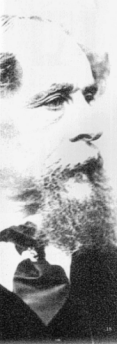|
 Charles
Dickens, the second of eight children was born on 7 February
1812 in Portsmouth. He grew up in extreme poverty. His
father, a warmhearted, kindly man,
was unable to support the family, fell into debt and was sent
to prison. At the age of eleven Charles left school and went
to work ,in a London blacking
factory pasting labels on bottles for
six shillings a week. Charles
Dickens, the second of eight children was born on 7 February
1812 in Portsmouth. He grew up in extreme poverty. His
father, a warmhearted, kindly man,
was unable to support the family, fell into debt and was sent
to prison. At the age of eleven Charles left school and went
to work ,in a London blacking
factory pasting labels on bottles for
six shillings a week.
The difficult childhood
years, his father's prison term,
the separation from his family, his own experiences in London
remained indelibly in his mind and appeared time and time
again as major themes in his books. The family fortunes improved, Charles went back to school, became an
office boy, a freelance reporter
and eventually a writer. He was also a social critic, a literary editor, public speaker,
talented actor, keen traveller,
long- distance walker and
active philanthropist. He achieved
instant fame with "Pickwick Papers" (1836-7) and he grew to be one of the most popular and respected authors of his time magnificently disproving those who claimed that his fame would disappear
as it had come. "Oliver Twist"
(1837), "Nicholas Nickleby" (1838-9) and the "Old Curiosity Shop" (1840-1)
were huge successes. "A Christmas
Carol" (1843), "Bleak House"
(1852-3) "Hard Times" (1854) and
"Little Dorrit" (1855-7) reveal
Dickens' deep concern for the injustices and shortcomings of
British society during the Victorian age. "A Tale
of Two Cities" (1859) "Great
Expectations" (1860-1) and "Our Mutual Friend" (1864-5) complete his major
works. He died on 9 June 1870 after a stroke. His marriage to Catherine Hogarth
with whom he had 10 children ended
in 1858. Dickens is buried at
Westminster Abbey in
London. |
Dickens' biographer Edgar H. Johnson said that 'Great Expectations' is 'the most perfectly constructed
and perfectly written of all of
Dickens's works'.
Novelist John Irving, says
that Great Expectations
'is the first novel I read that made me wish I
had written it; it is the novel that made me want to be a novelist - specifically to move a
reader as I was moved then'; while Andrew Sanders
in his History of English Literature claims that to
many readers 'Great
Expectations' remains the most completely satisfying and
haunting of Dickens's works. The story of the
boy who rises from rags to riches is not simply a Cinderella story with a male protagonist but a huge
canvas on which the author has painted with the most
vivid colours the entire human
condition. |

